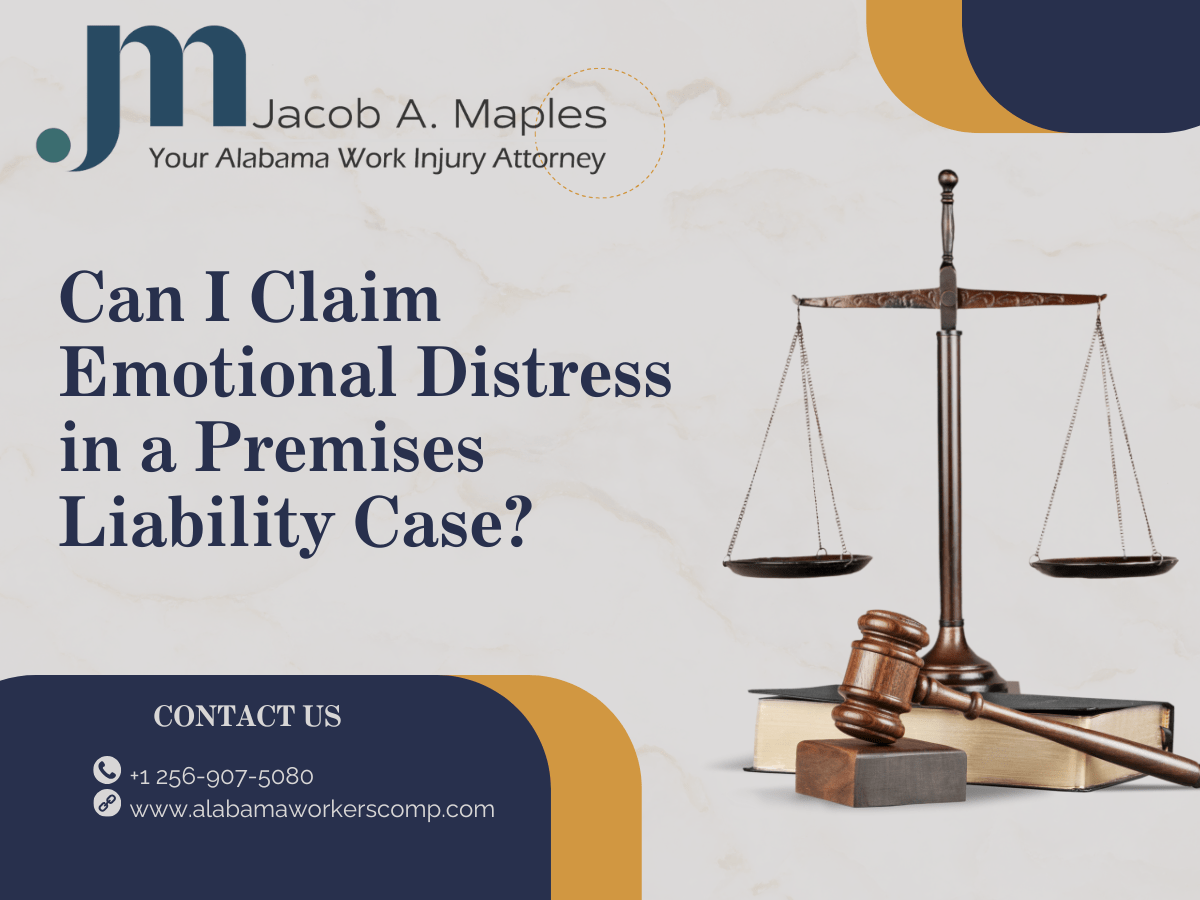When you’re injured on someone else’s property due to their negligence, you may wonder if you can claim compensation for emotional distress. Emotional distress, while often overlooked, is a significant component of damages in premises liability cases. In this article, we’ll explore how emotional distress fits into these claims and what you need to know to protect your rights.
At Jacob A. Maples Personal Injury Lawyer, we understand the emotional toll an accident can have on your life. Our goal is to ensure you receive fair compensation for all your damages, including emotional distress.
Understanding Premises Liability
Premises liability holds property owners accountable for maintaining a safe environment. If they fail to do so, resulting in injury to a visitor or tenant, they may be liable for damages. Examples of premises liability cases include:
- Slip and fall accidents.
- Dog bites or animal attacks.
- Injuries caused by inadequate security, such as assaults.
Damages in premises liability cases typically include:
- Economic damages: medical bills, lost wages, and other out-of-pocket expenses.
- Non-economic damages: emotional distress, pain and suffering, and loss of enjoyment of life.
What Is Emotional Distress?
Emotional distress refers to psychological suffering caused by an accident or traumatic event. Unlike physical injuries, emotional distress often manifests in:
- Anxiety and depression.
- Post-Traumatic Stress Disorder (PTSD).
- Sleep disturbances or nightmares.
- Difficulty maintaining relationships or handling everyday tasks.
For instance, a victim of a violent assault due to negligent security may develop a fear of leaving their home. This anxiety is a valid form of emotional distress that courts can consider.
Can You Claim Emotional Distress in a Premises Liability Case?
Yes, you can claim emotional distress as part of a premises liability case. To succeed, you must prove that:
- The property owner’s negligence caused the incident.
- The incident directly resulted in your emotional suffering.
Types of incidents likely to lead to emotional distress include:
- Severe injuries that disrupt your life.
- Situations that threaten your life or safety.
- Unsafe environments, such as toxic mold or hazardous chemicals, that impact mental well-being.
At Jacob A. Maples Personal Injury Lawyer, we specialize in identifying the full scope of damages our clients face, including emotional distress.
Evidence Required for an Emotional Distress Claim
To claim emotional distress, you need strong evidence to support your case. Key types of evidence include:
Medical Records
Documentation from a therapist, psychologist, or psychiatrist can show the extent of your emotional suffering. Physical symptoms, such as headaches or ulcers caused by stress, can also strengthen your claim.
Expert Testimony
An expert witness, such as a psychologist, can testify about how the event has impacted your mental health and ability to function.
Personal Testimony
Your own account of how the incident has disrupted your life is critical. Journals, emails, or letters detailing your emotional struggles can also serve as evidence.
At Jacob A. Maples Personal Injury Lawyer, we help gather and present this evidence to ensure your emotional distress claim is as compelling as possible.
Challenges in Proving Emotional Distress
Proving emotional distress can be challenging because it is subjective. Some common hurdles include:
- Variability in Responses: People react differently to trauma, making it hard to establish a standard measure of emotional distress.
- Legal Standards: Some states require physical injuries alongside emotional distress claims.
- Defenses by Property Owners: Property owners may argue that your distress is unrelated to the incident or not severe enough to warrant compensation.
Our team at Jacob A. Maples Personal Injury Lawyer understands these challenges and knows how to navigate them effectively.
Compensation for Emotional Distress
The value of an emotional distress claim depends on factors such as:
- Severity of the emotional impact.
- Duration of the distress.
- Evidence provided to support the claim.
Emotional distress is often part of a broader premises liability claim. However, in some cases, it may be a standalone claim, particularly if the psychological harm outweighs physical injuries.
Why Hire Jacob A. Maples Personal Injury Lawyer?
Hiring an experienced attorney is crucial for successfully claiming emotional distress. At Jacob A. Maples Personal Injury Lawyer, we:
- Build a strong case with compelling evidence.
- Negotiate with insurance companies to secure fair compensation.
- Handle all legal complexities, so you can focus on healing.
Key Points About Emotional Distress in Premises Liability Cases
- Emotional distress is a valid claim in many premises liability cases.
- Proving emotional distress requires strong evidence, including medical records and expert testimony.
- Legal expertise is vital to navigating challenges and maximizing compensation.
FAQs About Emotional Distress in Premises Liability Cases
1. Can I claim emotional distress without physical injuries?
Yes, but it depends on your state’s laws. Some jurisdictions allow claims for emotional distress without physical injuries if negligence is proven.
2. What types of incidents commonly lead to emotional distress?
Incidents such as violent assaults, severe injuries, or exposure to hazardous conditions are common causes of emotional distress.
3. How long do I have to file an emotional distress claim?
The statute of limitations varies by state. It’s essential to act quickly to preserve your rights.
4. How do courts determine if emotional distress is valid?
Courts evaluate medical records, expert testimony, and personal accounts to determine the validity and severity of emotional distress.
5. Will emotional distress claims increase my overall compensation?
Yes, successful emotional distress claims can significantly increase the total compensation you receive in a premises liability case.
Conclusion
Claiming emotional distress in a premises liability case is complex but achievable with the right approach. By understanding your rights and gathering the necessary evidence, you can pursue fair compensation for the psychological harm caused by someone else’s negligence.
At Jacob A. Maples Personal Injury Lawyer, we are committed to helping clients in Huntsville and beyond achieve justice. If you believe you have an emotional distress claim, contact us today for a consultation. Let us help you navigate your case and secure the compensation you deserve.






Comments